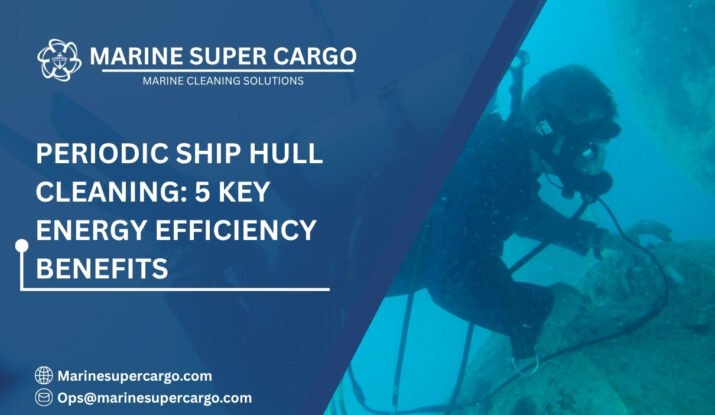Imagine your vessel’s hull as an athlete’s running shoes. A little mud slows things down. A lot of mud? Well, you’re not winning any races.”
That’s the reality for ships traversing global seas. Periodic ship hull cleaning isn’t just about keeping up appearances—it’s a vital ritual that supercharges efficiency, safety, and sustainability for modern fleets.
Whether you operate a single cargo ship or manage a bustling fleet, understanding why periodic ship hull cleaning matters is essential for staying ahead. In this guide, we’ll uncover five game-changing benefits and break down the technical, regulatory, and environmental impact for ship operators like you.
Cleaner Hulls, Greener Oceans: Boosting Energy Efficiency
Picture the hull of your vessel slicing through water like a knife through butter—a clean surface moves effortlessly, while a fouled hull drags like dull steel through thick clay. Over time, marine organisms—algae, barnacles, slime—latch onto the hull, increasing roughness and resistance, known as “biofouling.”
The science is simple. Every layer of biofouling adds friction, forcing engines to work harder and burn more fuel. Regular periodic ship hull cleaning trims this underwater beard, shrinking drag and unlocking fuel savings that ripple through your entire operation.
- Studies by IMCA and IMO confirm: A fouled hull can increase fuel consumption by 20–40%. That means a well-maintained hull isn’t just moving faster—it’s moving smarter, saving thousands in bunker costs.
- MARPOL Annex VI mandates shipowners to minimize energy usage and reduce emissions—periodic ship hull cleaning is a direct path to compliance.
Think of it this way: Every minute delayed cleaning risks pouring money (and carbon) into the ocean.

Compliance Confidence: Meeting IMO and MARPOL Standards
In the maritime world, compliance isn’t optional—it’s survival. The International Maritime Organization (IMO) set strict benchmarks for greenhouse gas (GHG) emissions and environmental stewardship.
But why does periodic ship hull cleaning matter for compliance?
- Hull cleaning directly reduces friction-related fuel consumption, cutting CO₂, NOₓ, and SOₓ emissions—key targets of MARPOL and IMO’s Energy Efficiency Existing Ship Index (EEXI).
- Operators who miss routine cleaning risk exceeding emission quotas and facing fines or port denials.
By integrating periodic ship hull cleaning into your planned maintenance system, you’re not just ticking boxes. You’re demonstrating responsible stewardship and ensuring your fleet passes inspections and audits—every single time.
“Maritime security is a shared responsibility”: IMO Secretary-General to @UN Security Council.
— International Maritime Organization (@IMOHQ) August 12, 2025
Full story here: https://t.co/pSPLGdKCJq pic.twitter.com/3E40z40JAE
Lower Fuel Costs: Every Batch of Biofouling Has a Price Tag
Let’s break this down with an analogy: If money leaks from your wallet every mile you drive, you’d fix the holes—fast. The same logic applies at sea.
A single voyage with a fouled hull can waste enough fuel to power a small town. According to a Marine Insight report, a container ship with moderate biofouling spends up to 40% more on fuel annually. Those extra costs add up, especially at current bunker rates.
Here’s what periodic ship hull cleaning delivers for your bottom line:
- Immediate reduction in engine load means lower operational expenses.
- Financial forecasts become predictable—no more nasty surprises from hidden inefficiencies.
- Clean hulls enable accurate budgeting and resource planning.
It’s simple: Regular cleaning isn’t just a maintenance cost—it’s a profit multiplier.
Prolonged Life and Performance of Hull Coatings
Coatings aren’t magic shields—they’re precision-engineered systems designed to reduce friction and block marine growth. But even the best antifouling paint needs help.
Periodic ship hull cleaning protects these investments, removing early-stage fouling before it penetrates or damages the coating.
Why does this matter?
- Proactive cleaning extends coating lifespan, reducing the need for repairs and costly dry-dockings.
- Operators maintain optimal hydrodynamic flow, boosting hull integrity and vessel speed.
IMCA guidance states that planned cleaning is vital to maximize coating performance, especially on newer vessels with advanced hull paints.
Think of your hull coatings as high-performance tires—regular cleaning keeps the tread intact, ensuring safe, efficient journeys every time.
Sustainable Operations: Protecting Marine Ecosystems
Compliance is just step one; true leadership means safeguarding our oceans for future generations. Periodic ship hull cleaning plays a pivotal role by minimizing biofouling—a major vector for invasive species migration.
When vessels move from port to port, biofouling can introduce non-native species, threatening local marine life. IAPH and IMO flag this as a growing risk.
- Regular cleaning, compliant with MARPOL guidelines, limits biological pollution and helps preserve biodiversity.
- You become an ambassador for sustainable shipping, reinforcing your company’s reputation and attracting like-minded partners.
In the era of “Clean Seas,” your fleet’s commitment to periodic ship hull cleaning is a public promise—one that benefits the entire maritime community.
Innovative Trends: The Future of Hull Cleaning
As technology advances, so does the hull cleaning industry. New robotic systems and eco-friendly cleaning methods are reducing environmental impact and enhancing safety.
- Underwater robots now perform periodic ship hull cleaning with minimal disruption, using gentler brushes and targeted suction.
- Digital monitoring systems track hull roughness in real-time, predicting optimal cleaning intervals.
Forward-looking ship operators are integrating these solutions for smarter, safer, more sustainable hull maintenance.
Easy Implementation: Building Your Cleaning Strategy
Ready to make periodic ship hull cleaning a fleet-wide standard?
- Establish cleaning intervals based on vessel type, trading routes, and biofouling risk.
- Use certified contractors and tools meeting IMCA and CleanShip.co guidance.
- Document procedures to ensure compliance and track performance improvements.
Set reminders; make cleaning as routine as refueling. Your vessels—and spreadsheet—will thank you.

Real-World Impact: Case Studies and Operator Stories
Consider the story of a bulk carrier crossing the Pacific. After six months without cleaning, fuel use spiked, speed dropped, and emissions soared. Post-cleaning, the vessel improved its performance metrics by 15%, passing regulatory audits with flying colors.
Industry leaders like CleanShip.co showcase dozens of examples where periodic ship hull cleaning transformed operational costs and compliance scores—these are lessons backed by data, not hype.
Read also: Underwater Ship Hull Cleaning in China.
Conclusion
Periodic ship hull cleaning is more than a box to tick—it’s a transformative strategy that lowers fuel costs, ensures regulatory compliance, and champions planet-friendly shipping practices. By embracing regular cleaning, operators enjoy smoother voyages, healthier balance sheets, and stronger reputations.
Ready to future-proof your fleet? Make periodic ship hull cleaning a pillar of operational excellence. Explore clean technologies and proven expertise with a trusted partner like CleanShip.co.
FAQs
Q1. How often should a ship undergo periodic hull cleaning?
Periodic ship hull cleaning intervals depend on vessel type, trading area, and coating, but most experts recommend cleaning every 6–12 months for optimal efficiency.
Q2. Will periodic cleaning damage the hull coating?
When performed by certified technicians using IMCA-approved methods, periodic ship hull cleaning actually protects hull coatings—prolonging their life and maintaining antifouling properties.
Q3. Does hull cleaning affect marine biodiversity?
Yes. Regular cleaning reduces the transfer of invasive species, supporting healthy ecosystems and meeting IAPH guidelines for responsible shipping.
Q4. What regulations govern hull cleaning practices?
MARPOL Annex VI and IMO’s EEXI mandate minimum energy and emission standards, making periodic ship hull cleaning a critical compliance measure for ship operators.
Q5. What is the future of hull cleaning technology?
Innovations like underwater robots and smart monitoring systems are making periodic ship hull cleaning safer, greener, and more efficient for modern fleets.


